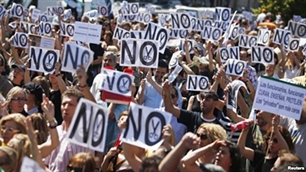Demonstrations in Spain and Portugal are spreading and likely to become riots in protest against government measures to raise taxes and cut spending as conditions of an international bailout.
Following the wake of Greece,
Ireland, and Italy, the
fourth and fifth largest economies of the Eurozone are deepening the region’s
public debt crisis. How to cure Europe’s
economic woes remains a big question, cutting spending and rising taxes hasn’t
proven effective. 
Spaniards demonstrate in Madrid against
government austerity measures
Tens of thousands of Spaniards packed the center of Madrid over the past few days, staging a rally against government austerity measures, called by the Social Summit, an association of more than 150 organizations, and the Workers’ Commissions and General Workers trade unions.
Most of the protesters are government workers. They displayed banners accusing the Spanish Government of serving the interests of the international financial markets, the European Union, and the International Monetary Fund instead of those of the Spanish people.
The strike followed a government’s announcement of new economic reforms by the end of this month which will be cut by US$125 billion over the next three years. In return, Madrid will receive the first US$36-billion- installment of the US$122-billion- bailout package of the IMF and other European financial institutions, designed to help Spain’s banks deal with bad debts from a real estate bubble and an unemployment rate of 25 percent.
Meanwhile in Portugal, demonstrations broke out in Lisbon and other cities involving an estimated one hundred thousand people. Clashes took place between demonstrators and security forces outside Portugal’s Parliament headquarters.
The IMF’s office was also attacked by protesters who blamed the IMF for Government austerity measures which require workers to pay more for their social security services. Protestors say the measures mainly affect the working classes, not the rich.
Trying to reduce public debt by cutting spending and increasing taxes has led to social insecurity in the region. The weakest economies in the Eurozone are facing numerous difficulties including feeble growth, loss of competitiveness in the international market, high unemployment, current account deficit and possible exclusion from the zone.
The Eurozone was expected to create many benefits for its members through integration, but differences between member economies have led to gaps in the region. Some have brought growth with inflation and trade deficits creating a regional imbalance.
European economists are casting about for an effective way out of the current mess. Recently, Eurozone leaders approached a consensus to boost growth by establishing a common mechanism to monitor banking.
Analysts say the region needs more fundamental solutions. The US policy of quantitative easing appears promising. This policy lowers interest rates while pumping money into circulation for directly purchasing the debts of Eurozone members.
The EU now needs to narrow the credit reliability gap between its members and issue Eurobonds to reduce the spending of countries in financial trouble. The proposal to issue Eurobonds is opposed by Germany. Eurozone members seem unable to reach a full consensus due to differences in the benefit each country anticipates from any proposed solution.
What the Eurozone members need to do now is to maintain their belief in their common currency in addition to applying flexible measures to cut spending. Analysts estimate that 17 countries in the Eurozone will continue to experience the economic downturn until the end of this year as they haven’t resolved the debt crisis to pave the way for growth recovery.
VOV5/VOV online


























